Father Gabriel Mejía, the “Mother Teresa of Colombia”… Iconic filmmaker David Lynch… Art Not War founders, Laura Dawn and Daron Murphy… Gang recovery activist Barry “Ra” Frye… Chicago school founder Nakisha Hobbs… Combat veteran and leader in post-traumatic growth Dusty Baxley… These world-changers electrified hundreds at the inaugural ChangeMakers conference at Maharishi University of Management® (MUM), April 6-7 in Fairfield, Iowa.
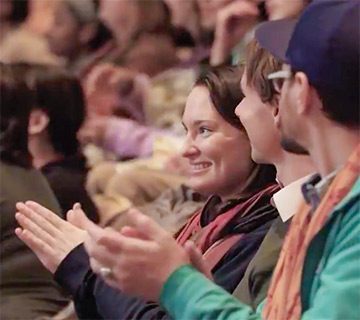
Hundreds attend inaugural conference for new MUM initiative, ChangeMakers: Disruptors Transforming the World for Good
“We are here to disrupt suffering,” said moderator Bob Roth, CEO of the David Lynch FoundationSM (DLF), which co-sponsored the conference with MUM and the Abramson Center for Peace.
As part of this new initiative, student government presented a month of events and workshops to help students find their passion and put it into action. After the conference, students were so inspired by Ra Frye and his work with recovering gang members, they invited Chicago Pride ROC to campus for a one-week retreat after they learned the Transcendental Meditation® (TM®) technique.
“How can we up our game so we, too, can be really big changemakers who make a difference in the world?” asked event producer Michael Sternfeld, welcoming the audience.
To inspire your own visions for creating positive change, here are highlights and videos sharing the wisdom of these extraordinary disruptors for good.
Bob Roth—“Change Begins Within”
“What did I learn from Maharishi about making a difference?” asked Bob Roth in his introduction, after a worldwide book tour for his New York Times bestseller Strength in Stillness: The Power of Transcendental Meditation. “A reporter once asked Maharishi, ‘What are the fundamentals of success?’ and Maharishi said two things: ‘Conviction and persistence.’ ”
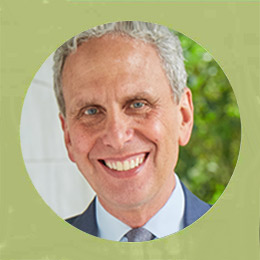
Bob Roth, CEO of the David Lynch Foundation and moderator for the ChangeMakers conference
Conviction is vertical, Roth explained: “I believe something from the core of my being… I have a conviction that I’m going to work for some cause to disrupt the status quo.”
And persistence? “That’s horizontal. That’s not giving up. That’s being resilient. Every single person you’re going to hear from the next few days has been, on one level or another, knocked down repeatedly. Doesn’t matter,” Roth said.
To be persistent and resilient for the long haul, “you have to take care of yourself,” he said. “You have to eat well and meditate regularly.”
Using the David Lynch Foundation slogan—and telling the story of how it came to be—Roth said, “Change begins within, and only begins within.” Guided by that principle, DLF has brought the TM technique to more than 600,000 individuals in high-risk populations throughout the world, including children in inner cities, veterans with PTSD, and at-risk women.
Jeffrey Abramson—“Make the Impossible Possible”
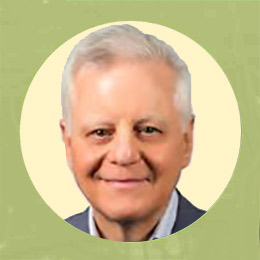
Jeffrey Abramson, Tower Companies and Chairman of MUM Board of Trustees
Jeffrey Abramson inaugurated the conference by telling his own story. As an award-winning real estate developer in green building and wellness architecture with the Tower Companies, DLF co-founder, and chairman of the MUM Board of Trustees, Abramson has been on the cutting edge of societal change for decades.
He started becoming a changemaker when he learned the TM technique. “The next day, I realized I was no longer the same person,” Abramson said. “Inside me there was this richness that was propelling me forward in life, and I felt like I could do anything.”
He decided to become a teacher of TM: “I felt that if I could give that gift, that inner peace, that health, that ability to transform yourself within and change your circumstances and communities and countries, then that would be the greatest gift that I could give someone.”
Soon he was on international staff with TM Founder Maharishi Mahesh Yogi. “We were being trained, masterfully, to take responsibility for the world,” Abramson said, and “to make the impossible possible,” as Maharishi would say.
Abramson has been making the impossible possible ever since, as an international authority on green building technology and a driving force behind advances in sustainable development and wellness architecture.
Q&A with David Lynch—“The Key to Everything”
When legendary filmmaker and philanthropist David Lynch connected by teleconference from his home in Los Angeles for his keynote address, Bob Roth asked, “Do you have a message for this opening session of ChangeMakers disrupting the world for good?”
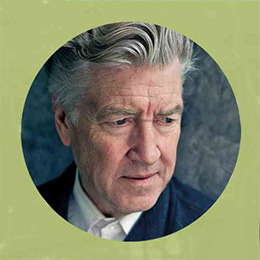
David Lynch, filmmaker and founder of the David Lynch Foundation
“Yes I do,” began Lynch. “The message is ‘Thank goodness for Maharishi Mahesh Yogi, who brought this technique called Transcendental Meditation, that allows any human being to dive within and truly transcend and experience that ocean of pure consciousness. This is the key to everything—accessing and utilizing that ocean of pure consciousness. And all you need is that. ‘ ”
An animated Q&A ensued, between students and the iconic director. What is his advice for people starting to discover their creativity? What should students do about crushing college debt? (“Buy a lotto ticket,” he suggested to roars of laughter.) What questions do you ask yourself to make change unfold?
“Just stay regular in your TM practice. Every day you’re going to be transcending—that’s the key to the whole thing. Within every human being is unbounded creativity,” Lynch said. “So you’ll find your own voice. You’ll never take a bad idea, but you’ll never turn down a good idea. You won’t take ‘no’ for an answer—and by the way, that’s the new motto for the David Lynch Foundation,” he added, to more approving laughter. “And you will be a bright and shining light for the world.”
Father Gabriel Mejía—The Transformative Power of Love
“We have to learn to hear the shoutings of humanity,” said Father Gabriel Mejía in his keynote address, speaking in Spanish through his translator. He has dedicated his life to heeding the calls of Colombia’s abandoned children, known as “the disposable ones.”
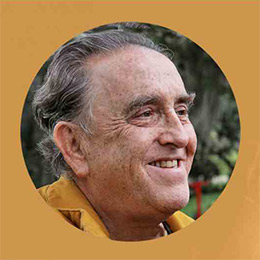
Father Gabriel Mejía, founder of Hogares Claret Foundation
Over the past 30 years, Father Mejía’s Hogares Claret Foundation has rescued and restored dignity to the lives of over 100,000 children and young adults through its 52 centers, which include the TM technique in their program. Father Mejía recently received the World’s Children’s Prize, the “Nobel Prize” for work with children.
One of 15 children himself, Father Mejía told the incredible story of how he became a priest and changemaker—starting with his mother teaching him that “family is sacred,” to creating hogares (homes) out of nothing for thousands of children.
“The greatest experience of my life was finding TM,” he said. “Praying is to bring your heart to God, and meditation is to bring God to your heart, and within that deep, inner silence, to find within ourselves this infinite potential we all carry. God never created rubbish. God makes us all perfect and complete.”
Father Mejía talked about using the transformative power of love in his work—seeing people for who they truly are. In a world full of resentment, “this is the moment to globalize love,” he concluded, to a standing ovation.
Father Mejía talks about his work, in Spanish with translation (30:37)
Laura Dawn and Daron Murphy—Art Not War
A founding member of MoveOn.org, Laura Dawn shouldn’t have made it to college, let alone become a cultural strategist, political activist, and lead singer for Moby’s band The Little Death. An Iowa girl growing up in rural poverty 90 miles from Fairfield, she recalled how seeing the film Gandhi changed her life.
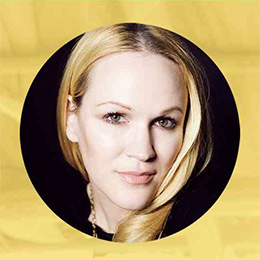
Laura Dawn, Art Not War co-founder
The first in her family to go to college, she paid her way with a “hillbilly spirit” that took her to New York City to become an artist and activist. By volunteering for the organizations she wanted to work with, she eventually became the Cultural and Creative Director of MoveOn.org, creating viral content and helping change the way political campaigns are run and won.
“My bit of advice if you want to be a changemaker is, if you want it, then go get it,” Dawn said. “Knock on every door until somebody lets you in, and then make yourself indispensable.” If someone needs rubber bands, “you go get rubber bands faster than anyone has ever gotten rubber bands.”
Daron Murphy, a musician, journalist, and director “always looking for real stories,” is Dawn’s partner and husband. He was also on the ground floor of MoveOn.org, on the creative and production team responsible for all television, radio, and online video content.
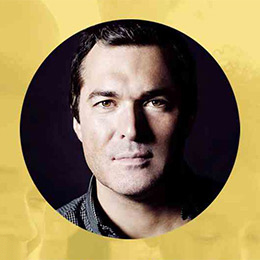
Daron Murphy, Art Not War co-founder
Today Dawn and Murphy are co-founders of the cultural strategy firm Art Not War. People are inundated with stories of violence and conflict, “and we want to flood them with stories of solutions, of healers, and world-changers, and thought-provokers, and paradigm-shifters, and peacemakers,” said Dawn to applause.
As part of this mission, the Art Not War team created the highlights video for the ChangeMakers conference embedded within this article.
“With meditation I evolved from ‘Don’t tell me what I can’t do,’ to ‘I joyously conceive of what I will do.’ I see what needs to be done, and I have the tools and the community around me to try,” said Dawn. “So be aware, work hard, be a connector, and be kind. That’s pretty much the only recipe I’ve been able to follow.”
Laura Dawn and Daron Murphy talk about positive activism (23:21)
Barry “Ra” Frye—“Get Out There and Get It Done”
Ra Frye, a veteran of inner-city warfare and domestic abuse, is now an urban peacemaker. He grew up on Chicago’s South Side, but his mother sent him to Denver at 15 to save him from gangs and addiction. He lived there and ran a construction business until he had a vision: Stop the violence in Chicago.
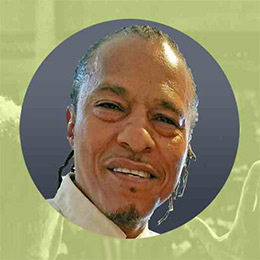
Ra Frye, founder and president of Pride ROC and Passages GRR, Chicago
“I was naïve, but I had intention,” Frye said. He returned to his neighborhood to work with gang members and bring Crips and Bloods together, founding Pride ROC (Refining Our Communities) and GRR Passages (Gang Rescue and Refinement).
The Pride ROC mission is “to execute integrated, trauma-healing Passages that rescue Urban Prisoners Of War (UPOWs) from their existing environment and initiate them into evidence-based remediation practices that will prepare them for holistic, collaborative, aftercare services as they transform into contributing members of our communities.”
The Transcendental Meditation technique is a key part of the Passages program. Chris Busch, DLF Chicago regional co-director, “instructed 19 gangsters how to meditate,” said Frye, noting this was the “right time, right place, in flow with the right message.”
Inspired by Frye’s account, MUM students invited these meditating UPOWs to campus for a retreat and to perform. As videomaker Werner Elkmer observed, “They lit up the stage with their raw energy, power, and joy, giving back to the community in celebration of their week-long retreat here.”
Frye is accomplishing the seemingly impossible—transforming the challenges of gang violence by regenerating its leaders with the Passages program. His advice to the next generation of changemakers? “I never asked permission,” he said. “Fear will shut us down. Get out there and get it done.”
Watch Ra Frye fire up the audience with his work and story (16:02)
Nakisha Hobbs—“Look within and Start to Be Disruptors”
As the child of teen parents growing up in urban poverty, Nakisha Hobbs attended 13 schools by the time she graduated. At an early age, she knew she wanted to become an educator herself, but not just a teacher, a principal—leading her own school to help kids like her survive and thrive.

Nakisha Hobbs, co-founder and principal of Village Leadership Academy, Chicago
“My life purpose is to inspire other young people to be changemakers,” said Hobbs, principal and co-founder of Village Leadership Academy, an independent K-8 school in Chicago. She created “an institution that will empower and build kids up, not just give them an education, and make them changemakers of their own lives and communities.” To do so, the Academy includes the TM-based “Quiet Time” program for its students.
She talked of how, in a storefront, she started a preschool that met the needs of its students so well it became a kindergarten—then a full elementary school—then a middle school.
The Academy’s “whole-child” education includes a social justice curriculum, Hobbs said, “so kids can see themselves in history and gain multiple perspectives.” Starting in kindergarten, children create and lead grassroots campaigns that identify a problem in their communities, understand the causes, and try to change it with a campaign.
And they succeed in a big way, said Hobbs: “We had a first-grade class that wrote letters to the governor, volunteered at a homeless shelter, and worked with a community ally to get $4 million put in the budget to support homeless youth.”
Watch Nakisha Hobbs on educating children to be changemakers (17:18)
Dusty Baxley—Transform Post-Traumatic Stress into Post-Traumatic Growth
After serving 22 years and three tours of combat as a U.S. Army Airborne Ranger Operations Specialist in Panama and two Gulf War ops, Dusty Baxley retired from the military. But the impact of war followed him home, and post-traumatic stress (PTS) led to plans to take his own life.
Then he “met a woman at a jukebox,” Baxley said. She saw the pain he was in and eventually told him, “You need to learn to meditate.” Reluctantly, he signed up to learn TM—dubious and ready to bolt.
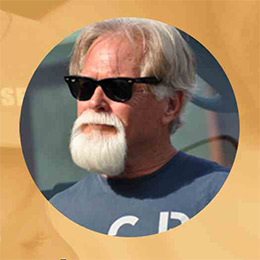
Dusty Baxley, executive director of Boulder Crest Retreat, Virginia
But from his first meditation, the TM technique changed Baxley’s life—he could sleep through the night for the first time in 18 years—and his life gained purpose. His veteran buddies saw the difference and asked him to teach them TM, but he wasn’t a teacher yet.
“You’re going to change the world for veterans,” then-president of Maharishi University of Management Dr. Bevan Morris told Baxley when they happened to meet. His prediction proved true.
Baxley became a certified TM instructor and has been changing PTS treatment ever since. After directing TM projects from Eisenhower Army Medical Center in Fort Gordon to the VA in Annapolis, he found his true home at Boulder Crest Retreat, a rural wellness center for veterans and their families in Bluemont, Virginia.
As executive director, Baxley has made the TM technique the cornerstone of the Warrior PATHH (Progressive and Alternative Training for Healing Heroes), to transform post-traumatic stress (PTS) into post-traumatic growth (PTG) for veterans. The program is so successful, they’ve opened a second retreat center in Arizona and are training teams around the country, partnering with DLF and TM for Veterans to teach the TM technique.
“If you want to truly disrupt, you’ve got to change the cause,” concluded Baxley. “What if we could open an institute for post-traumatic growth that opens in September with a $3 million grant?” he added, to great applause. “Let’s train mental health [professionals] to stop a symptom-based approach for trauma and have a wellness-based approach—and the cornerstone practice is Transcendental Meditation, the game-changer that brings us home to ourselves.”
Closing by Dr. John Hagelin—“The Purpose of Knowledge Is to Change the World”
To conclude this inaugural ChangeMakers conference, MUM president and renowned quantum physicist, John Hagelin, Ph.D., told his own story. From pioneering research in unified field theory at Stanford and CERN (European Center for Particle Physics) to his cutting-edge research on the TM and TM-Sidhi® programs and world peace at MUM, and as international president of the Global Union of Scientists for Peace, Dr. Hagelin has helped change what’s possible. Along the way, he influenced policy and politics, too.
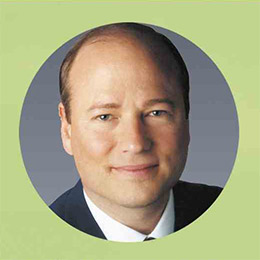
Dr. John Hagelin, quantum physicist and president of Maharishi University of Management
In 1992 Dr. Hagelin was teaching at MUM (then MIU, Maharishi International University) when he got an unexpected phone call from Maharishi. Government needed fresh ideas and sound programs based on what really works, and we need a scientist to bring evidence-based solutions to the table. “If not you, who else?” Maharishi asked. “The purpose of knowledge is to change the world.”
Soon Dr. Hagelin was the presidential candidate for the Natural Law Party (NLP), a third party with a science-based platform committed to holistic and preventive health care (including the TM technique), clean energy, conflict-free politics, ending PACs, and labeling GMOs. With Dr. Hagelin’s leadership, the NLP was on the ballot for the 1992, 1996, and 2000 presidential elections in 48 states. (At its peak, the NLP was also active in 74 countries around the world.)
Dr. Hagelin explained that, like other U.S. third parties that helped abolish slavery and achieve women’s right to vote, the NLP did not win the presidency. But it did help change ideas in society and raise public awareness on preventive health care, campaign finance reform, TM in the Pentagon, and GMO labeling.
“Plant your feet in infinity, and from there the whole world revolves around you,” Dr. Hagelin advised, quoting Maharishi. “From the vantage point of infinity, you can change anything.”
Watch Dr. John Hagelin’s concluding remarks for the ChangeMakers conference (12:12)
Find out more about Maharishi University of Management and Consciousness-BasedSM education ►

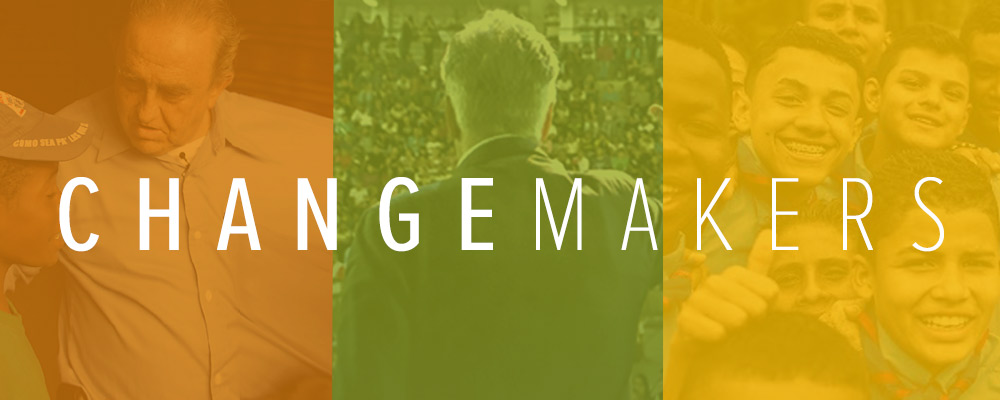
Comments
you may also like
TM in the News
The Smithsonian Honors David Lynch for Bringing TM to 500,000 At-Risk Kids
The director received the American Ingenuity Award for reducing stress and violence in under-served schools through the David Lynch Foundation, which has been improving children's lives with the TM-based "Quiet Time" program since 2005.
Helping Others
2017 Change-Makers Bring Hope to Chicago, Inner Peace to Veterans, Health to Women at Risk
Our TM heroes are creating positive transformation around the U.S.—bringing the life-saving benefits of TM to women who are victims of assault; turning post-traumatic stress into post-traumatic growth for veterans; helping Chicago schools reduce violence and improve lives.
TM in the News
Chicago Tribune: Can TM Help Curb Youth Violence? | 4:33
The front page of the Tribune offers hopeful news: The University of Chicago Crime Lab has joined forces with the David Lynch FoundationSM to transform lives and research the effects of the TM-based “Quiet Time” program in at-risk schools.
Science & Research
Can Meditation Help Create Peace in the World? | 1:04
Scientists and world leaders propose a “technology for peace” to reduce societal stress, tension, and war. Quantum physicist Dr. John Hagelin explains how this evidence-based methodology works in a HuffPost Live interview.